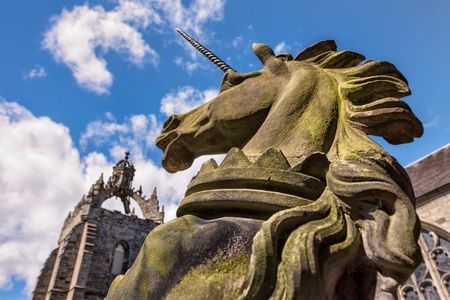The University of Aberdeen's expertise in environmental research and its positive impact on society has been highlighted in two newly published and influential league tables.
In the latest Times Higher Education (THE) Impact Rankings, which recognises universities for their social and economic impact under the United Nations’ 17 Sustainable Development Goals (SDGs), the University is ranked among the top 200 universities in the world for its societal impact.
Meanwhile, the University has also been highlighted as Scotland’s best University for environmental research in terms of impact, according to the QS World University Rankings by Subject.
With sustainability high on the agenda for universities globally, the THE Impact Rankings expanded this year to include 1,406 institutions worldwide, almost 300 more than last year.
The University was ranked in the 101-200* range overall, performing well in areas including Climate Action (SDG13) and Decent Work and Economic Growth (SDG8), where it placed 48th globally for both. Overall the University is ranked within the top 100 globally in eight SDG areas.
Meanwhile, The QS ranking compared performance of Environmental Sciences departments at 42 UK universities and found that Aberdeen is Scotland’s best University for environmental research in terms of impact, partly due to a high level of global collaboration which has seen it publish 75% of its total 1,613 published research papers with international partners - more than any other Scottish university.
The University’s highly cited work on zero-carbon technology has attracted significant attention, specifically renowned climate scientist Professor Pete Smith’s work on the benefits and challenges associated with negative emissions technologies (NETs) intended to result in the net removal of greenhouse gases, which is its most cited paper of the past five years.
Sustainability is a key pillar of the University’s 2040 strategy, and the results of both rankings reflect work ongoing across the University involving both Professional Services and Academic Schools including research leading to the development of the Cool Farm Tool app, an online calculator to help reduce greenhouse gas emissions, protect soil fertility and reduce environmental impact from crop and livestock production.
Led by Professor Pete Smith, it has recently been shortlisted for the Research Project of the Year Award in the upcoming Herald Higher Education Awards. Meanwhile, Professional Services staff have also been shortlisted in the Marketing/PR Campaign of the Year category, for their work to promote the University’s activities around last year’s COP26 conference in Glasgow.
In addition, Professional Services staff continue to ensure the University makes positive progress in delivering on its commitment to achieving net zero emissions before 2040, in areas such as waste management, recycling and energy management.
Professor Karl Leydecker, Senior Vice-Principal at the University of Aberdeen, said:
“I am delighted at our success in both the THE Impact Rankings and QS World University Rankings by Subject, reflecting our institutional commitment to sustainability and our world-leading research in environmental sciences.
“Our Aberdeen 2040 strategy makes clear our commitment to act as a leader for the sustainable future of our planet through our research and our institutional activities, and we encourage our staff and students to work and live sustainably and to lead by example for the good of the local community here in the north-east of Scotland and in the wider world.
“Our performance in the rankings is testament to the breadth and depth of our institutional activities – from interdisciplinary research that is helping address global challenges including climate change, health inequality, and food poverty, to operational measures helping the University achieve its ambition of net zero emissions before 2040.
“I’d like to thank all our staff and students for their efforts in helping us deliver these results, which come against a backdrop of increasing competitiveness. We look forward to continuing our progress in the years ahead as part of our ongoing efforts to support the UN Sustainable Development Goals.”


